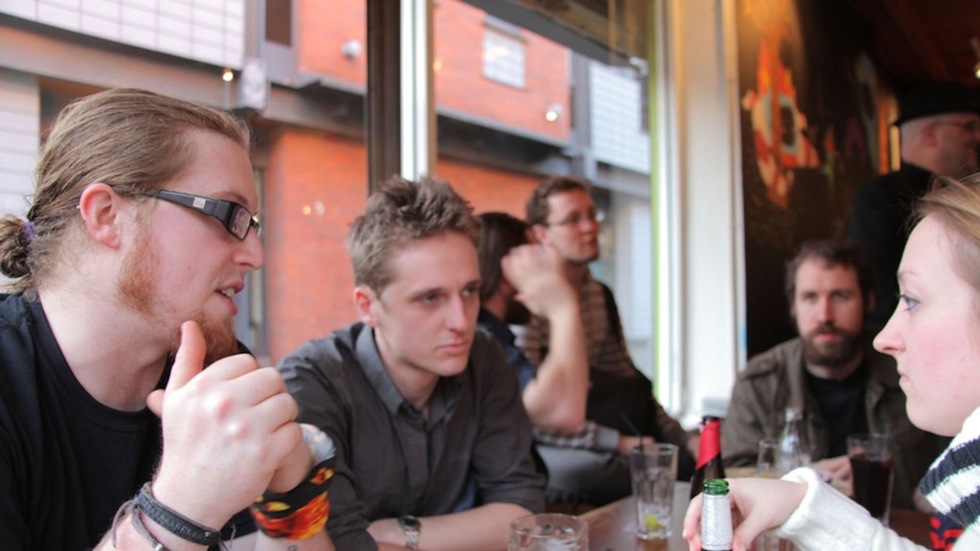
BY MARIAH PHILLIPS |
Kino Explosion: How a Film Movement Becomes a Social One
What if you only had 48 hours to make a film with strangers? Around the world, amateur and professional filmmakers are doing just that. Here's everything you need to know about the Kino movement.

The motto of Kino is ever present when talking to Kinoïtes. “They’ve been infected!” laughs Lukas Scheper. He’s just returned from Shanghai’s first Kino Kabaret, and back in Hamburg, he’s still on fire with Kino’s power. “You can find your way with Kino.”
“Do well with nothing. Do better with little. But do it now!”
Kino is a film movement designed to foster creativity amongst film lovers. “Kinoïtes," as they affectionately call themselves, develop, write and shoot short films within 48 hours. It requires problem solving, innovation, and resilience. Kinoïtes swear by it. “Do well with nothing. Do better with little. But do it now!” they say, echoing their founder’s words.
Do Well with Nothing
Montreal, January 1999. Christian Laurence, Jéricho Jeudy and about 20 others decided to make a pact: they would make one short film a month until January 2000. Their budgets were virtually non-existent, but with careful deadlines and creativity, they managed to keep that promise. Jéricho Jeudy says the exercise taught them “there are other means by which we can make films. You don’t have to be a millionaire.”
It couldn’t have come at a better time. Digital cameras were just becoming available, allowing filmmakers to edit on their computers. The cost of making movies had decreased, and without the threat of expensive film, many were becoming more experimental. In another 10 years, with advances in technology and method, the price may drop even further.
The movement finds its roots in cinéma direct, a means of making films modestly, with fewer resources. It resulted in films based more on feeling and intuition than theory. Jeudy calls them “the most audacious films.”
“Kino lets people make the films they want…tell the story they want, the way they want,” says Samuel Hilton of Kino Sydney. “Cinema should be a democratic process.” Filmonik Manchester’s Jonathan Pratt says that not being tied to big budgets allows for more variety in film.

Yet, Kino is as much a social movement as it is a film movement. Hannaleena Hauru of Kino Euphoria in Helsinki says she has been “Enjoying cinema as a community experience. Film makes you meet people you wouldn’t normally meet.” There are Kino cells in England, France, Germany, Morocco, Israel, Australia, Burkina Faso—and that’s just the tip of the iceberg. “Each country has its own film style,” notes Filmonik’s Jenny Longworth.
The highlight of the Kino calendar is the Kabaret. During seasonal Kabarets, participants live, eat, and work together. These temporary communes last at least 48 hours. In that short amount of time, Kinoites form creative teams and make films. Let me repeat that: 48 hours. Start to finish. The result is undoubtedly the most harried, exuberant, mind-blowing experience. “You don’t have time to get emotionally attached to projects,” says Jérôme Charreton of Kino LugdunUM in Lyon. Steve Balshaw of Filmonik likens it to a jam session.
There’s more to lose, but there’s also nothing to lose.
Do Better with Little
In 2008, Lukas Scheper says they experimented with elongating the allotted time to 60 hours. “There was less energy,” he groans. “The films were less risky, less interesting…more complicated.” That’s where the “do better with little” comes in.
In order to complete the film on schedule, it is impossible to work on several ideas at a time. Once the team has committed to a concept, they have no choice but to follow through. There’s more to lose, but there’s also nothing to lose. One of the key markers of the Kino Kabarets is that there are no prizes. No “best use of editing equipment”, no “most likely to succeed”, and definitely no “best director/writer/actor/costume designer/caterer/dog walker”.
Having made a film is your only prize for participating in a Kino Kabaret.
There are no genre or character constraints, either. This is where it differs from the popular 48-hour film challenge. Karim Aitgacem of KinoPaname in Paris says that at Kino you have “The right to experiment, to err, to mess up completely, and to have only a bruised ego as a consequence”. Having made a film is your only prize for participating in a Kino Kabaret. And if the film isn’t what you wanted or imagined it to be? “Do better next time, but next time is tomorrow, not six months later,” Scheper shrugs.
In Sydney, the time is even shorter. Realizing that many Australians didn’t have the time for 48-hour sessions, Kino Sydney has reduced the time to 32 hours. Hilton says they have also started “mini Kabarets”, with 1 session instead of the traditional 2 or 3. During their Kabaret season, Kino Sydney typically plans 1 mini Kabaret a weekend over a three-week period. This allows more people to participate; Hilton adds that they’re considering having mini Kabarets on random weekends, rather than three consecutive ones.

This cross-cultural affair attracts amateurs and professionals alike; everyone has something to contribute. One man at HamburgerKino’s 2012 Kabaret, Dave Kavanagh, was a schoolteacher in Manchester by trade, but came to Hamburg to contribute soundtracks for the Kino films. “Kino isn’t as glamorous as Hollywood. I believe that independent films must be made urgently; they are the last auteur films...Film for film’s sake,” muses Jeudy. “Mainstream cinema needs a shake up!” remarks Hilton.
"Go out there and find new stories; we’ve tired of the old ones."
Do It Now!
By now, you may have noticed that the Kino cells in the United States are few and far between. Every cell I talked to had a different theory as to why, but they all agreed on one thing.
We’re missing out.
“In my heart—I was just discussing this with friends—in my heart, the only thing that saddens me in today’s cinema is the lack of novelty. Go out there and find new stories; we’ve tired of the old ones,” sighs Jeudy.
Starting a Kino cell may be easier than you think. All it takes are a few motivated and inspiring people. Just four people started HamburgerKino, but they were passionate about what they were trying to do. Now, they are amongst the biggest and oldest Kino cells in Europe.
Don’t worry about finding the right “vibe.” Charreton says that it might not feel natural at first, but soon everything will fall into place. Each cell is unique, but founded on the same principle: it is a community of exchange. This exchange extends past the world of cinema, and into the microcosm created by these cells. By such methods, you cultivate a film culture and avoid the trap of making “a beautiful show that completely misses the point,” according to Jéricho Jeudy.
“90 % of Kino,” says Dave Lojek of Kino Berlino, “is not the films. It’s how you came to make them. It’s a sort of embryonic filmmaking.”
Talk to Kinoites from the more established clubs. They can relate their experiences of starting up a cell and how they grew. Samuel Hilton shared with me some of the challenges faced by Anglophone countries, especially ones far from the huge European network. “Australia and America are very much alike in that there’s more pressure,” nods Hilton, but he assures me that running a successful cell is absolutely possible. “Kino fills a gap.”
All you need is a place for members to come work/brainstorm. It could be your basement apartment or your local bar. Build up a relationship with a rental equipment shop; Kinoites who don’t have cameras and other tools can rent them there. If you can find even one person interested in starting a Kino cell, Jeudy gathers a team for a “pop-up Kabaret”. For 4-5 days, he leads the process of filming and showing Kino films—the best way to experience a Kabaret firsthand.
Lastly, remember that Kino is about having fun. It was designed to take some of the stuffiness out of formal filmmaking and develop a space for création libre. “We wouldn’t do it, if we didn’t love it,” comments Balshaw. It is, as Jeudy puts it, “An incubator for talent, but also an incredibly enjoyable, non-intimidating experience.”
Helpful Links to Learn More:
http://kino00.com/english/history/
Mélodie Grumberg, Miss for Kino Sydney
Une Chute Sans Fin Seb Houis for Kino Fada (Marseille) 2012 Kabaret

